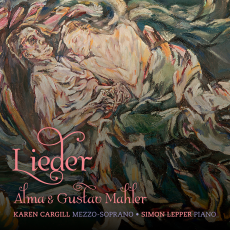Karen Cargill - Mahler: Lieder - International Record Review
Karen Cargill's voice was made for Gustav's music, and we can now determine that it suits Alma's equally well. Cargill's voice is one of the loveliest that we have today. She's officially a mezzo, but her glory is definitely the lower octave, which boasts contralto-like velvet that one would be hard-pressed to surpass among mezzos of her generation. She can lighten up effectively, and can also sustain phrase after phrase of effortless mezza voce.
Alma Mahler's five songs - set to texts by Dehmel, Hartleben, Bierbatnn, Rilke and Heine - are a delight. Cargill sounds comfortable with all of them, the best being 'In meines Vaters Garten', an intoxicatingly romantic, classically fln-de-siecle number in 6/8. The voluptuous voice effectively narrates this poem about three princesses sitting under an apple tree. A fine air of nostalgia colours 'Laue Sommernacht'. In what is harmonically the boldest of the songs, 'Bei dir ist es traut', the voice fades away exquisitely into the soft postlude, and an airiness in the quiet singing that would generally be out of place in most Lieder actually works to her expressive advantage, which it does not in the last of the songs, 'Ich wandle unter Blumen'.
The same sorts of comments apply to the Rückert Lieder, beginning with 'Blicke mir nicht in die Lieder', rather blank interpretatively, although musical and firm-toned. The text could be more distinctively savoured in an otherwise excellent traversal of 'Ich atmet' einen Linden Duft! '. Cargill's command of pianissimo greatly enhances 'Liebst du urn Schonheit' and 'Ich bin der Welt abhanden gekomrnen', although in the latter song one misses the luminous smile in the tone that others have brought to the final moments. Key phrases of 'Urn Mitternacht' are prone to neglected consonants, but the grand-scale final pages are thrillingly done.
The Lieder eines fahrenden Gesellen Cargill manages more than creditably on the vocal side. She can't exactly float the pp high G sharp toward the end of 'Ging heut' morgen', but it's secure nonetheless, and the high spirits earlier in the song emerge persuasively. 'Ich babe ein gliihend Messer' works, too - the opening really blazes, with sufficient bite - but there are numerous instances elsewhere where vital portions of text are rendered with a frustrating lack of specificity: in the first song, for example, the whole 'Geh' ich in mein Kammerlein' is neutrally done. Likewise, the opening text of 'Die zwei blauen Augen' is given with not nearly enough crispness. These are details that really could make all the difference in this gifted singer's Lieder performances. Cargill is at her superb best with the disc's concluding song. I assume that she's sung Urlicht many times, and the experience shows. She shapes those long lines with complete control, musical and textual needs are equally cared for, and - observing the 'sehr zart' marking - fittingly, on the word 'leuchten' she produces perhaps the most ravishing tone in the entire disc.
At the piano, Simon Lepper connects admirably with his colleague, displaying a terrific nimbleness when needed and all the required sensitivity and mood-setting. Cargill's voice is a little too closely recorded. The booklet includes an insightful, beautifully structured essay by Gavin Plumley.


